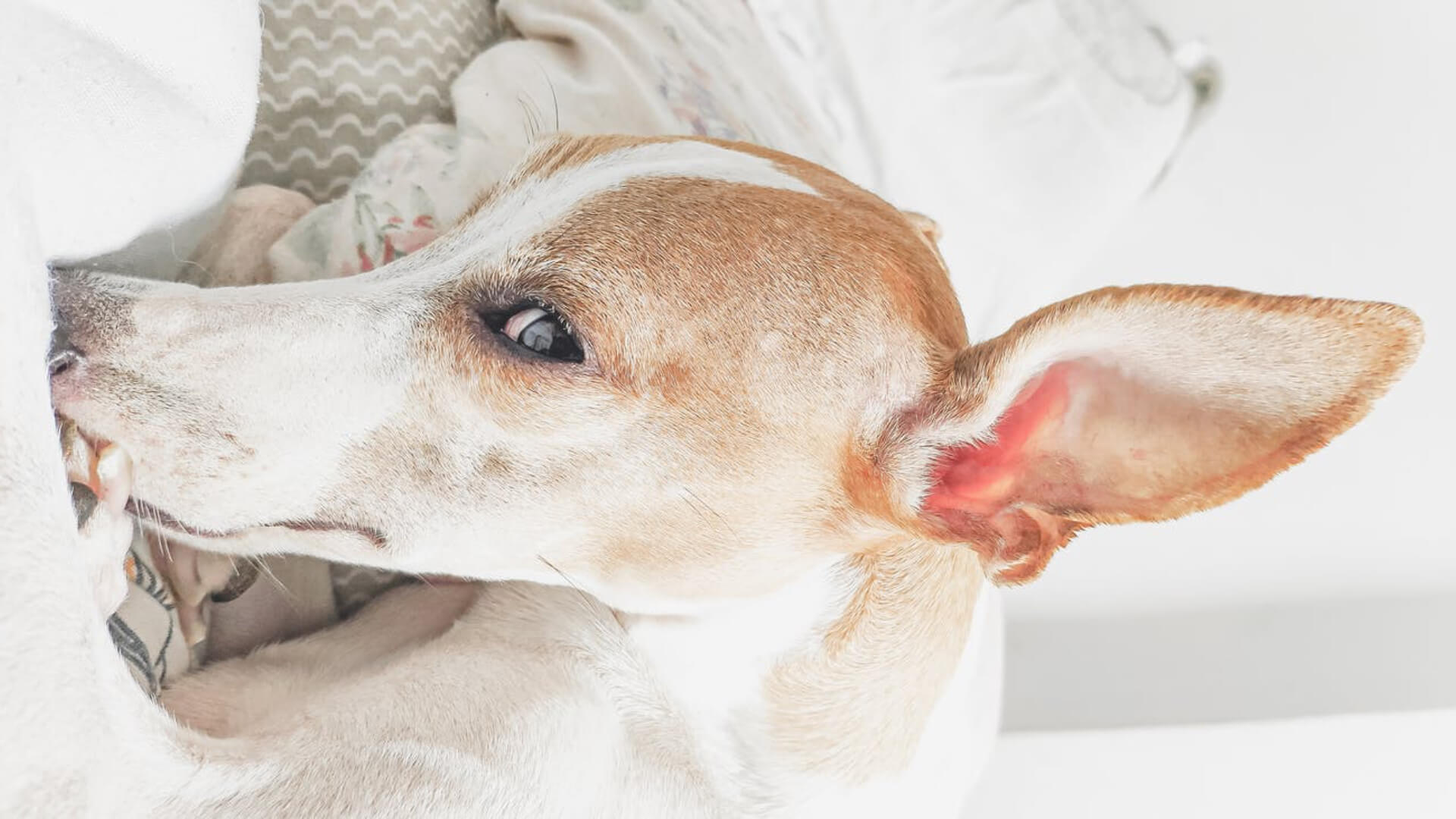Puddle drinking - Vet interview
Reading Time: 10 Minutes
Many dogs like to drink from puddles or other standing waters, which is usually harmless, but may lead to infection with bacteria called giardia. Does your dog like to drink from puddles? Our vet, Philipp Schledorn, will work you through the issue of what may happen if dogs gets infected with giardiasis in the following interview. Giardiasis (popularly known as beaver fever) is a special type of diarrhoea caused by parasites.
Jens from AniForte UK: Let's just start with the first question: Is it harmless if dogs drink from puddles?
Vet: Puddle water is a very beneficial place to breed for bacteria called giardia or giardia intestinalis. These are small intestine parasites that can cause diarrhoea in dogs. Giardia get transmitted by contaminated water, food or by animals already infected. Please be aware that an absorption of giardia does not necessarily lead to an outbreak of the disease giardiasis. A rough estimate is that 15-20% of all dogs are infected with giardia.
Jens from AniForte UK: How do I recognize my dog is infected with giardiasis? What are the symptoms?
Vet: The most obvious symptom is chronic diarrhoea. Feces may appear slimy yellowish, thin and/ watery. This is usually accompanied by a bad rotten smell. Also bloody diarrhoea is common. Dog owners should be alarmed if these symptoms are recurring or complemented by vomiting, a loss of weight, loss of appetite or apathy.
Jens from AniForte UK: Can every dog possibly get infected with giardiasis?
Vet: Theoretically, yes. However, puppies and young dogs are more likely to get infected since their immune systems are not as strong as those from mature dogs yet. Consequently, defense forces are less developed. As I already said, giardia may stay in the dog’s system without an outbreak given a strong immune sytem. If dogs are kept in large groups (f.e. breeding and animal shelter), then chances of an outbreak increase a lot.
Jens from AniForte UK: What causes giardiasis?
Vet: Giardia are single-celled organisms that occur as parasites in the intestines of dogs. There are different pathogenic strains. Among dogs, genotypes C and D are the genotypes that occur the most. Humans can also infect themselves with strains A2 and B.
However, research shows that parasite strains remain most likely within their species boundaries. Zoonosis, a disease transmitted from animals to humans may occur in a very few cases. The exception proves the rule though.
A much more common way of getting infected is through the reproductive stages of the parasites (cysts) when picked up while drinking from contaminated puddles or eating contaminated feed. Another way of getting infected is through feces from fellow dogs by licking paws.
Very few cysts are sufficient to cause an infection. A strong and a healthy immune system will have a positive influence on the course of the disease.
Jens from AniForte UK: How can giardiasis be diagnosed?
Vet: Dog owners should see their vets in the first place. Vets will then take fecal samples to find evidence for giardia DNS or giardia antigen. It is very important to provide the vet with fecal samples from 3- 5 days since pathogens are likely to not be found in every stool. Thus, providing multiple samples is critical in order to get a valid result.

Jens from AniForte UK: What would you suggest to do if there is an initial suspicion of giardiasis?
Vet: I do recommend a checklist. The following checklist is a useful guide in case of uncertainties in terms of whether the dog’s diarrhoea is related to giardiasis or not.
- How old is my dog? Does he or she belong to the risk group of young animals?
- Where is my dog from? Is he from an animal shelter?
- Does he spend a lot of time together with other pets (f.e. in dog school)?
- When was the last time he suffered from diarrhoea? How did the stool look like?
- Does he have diarrhoea on a regular basis?
- Did he throw up recently?
- When did he get the last worm treatment?
- How is his general state of health?
- Do you think he may have abdominal pains?
- Does he like to eat?
- Do you own multiple pets? If so, what pets?
- Do you know about previous diseases?
- Does he currently get treatments? If so, what treatments?
If the checklist supports your first impression or if diarrhoea continues, please schedule an appointment with your vet.
Jens from AniForte UK: What is the appropriate treatment?
Vet: I recommend a treatment with antiparasitic drugs over the course of several days. These usually come as tablets or paste. Dog owners should run a test for every pet in the household, if there are multiple ones. This is important even if the all of them except for one appear to be healthy. As I mentioned earlier, giardia may be easily transferred from animals to animals.
Jens from AniForte UK: How can dog owners support during the recovery process?
Vet: Besides the regular treatment with drugs, please make sure you keep hygiene measures high during the recovery process. It is also beneficial to clean and disinfect the environment, for example by hot washing blankets, bowls, toys and places your dog likes to hang out. This is essential to get rid of the cysts.
Wash your dog’s fur thoroughly with dog shampoo. You may also want to shorn hair in the anal area. In addition to this, measures as those for regular diarrhoea are beneficial. These include, among others, changing the diet to an easy- digestible feed and making sure enough drinking water is available. Supplements such as Slippery Elm Bark help to alleviate stomach complaints.
It is important to keep checking the progress by means of regular fecal samples.
Jens from AniForte UK: What are the odds of a successful recovery?
Vet: Here are the good news. A forecast is affordable, however, treatment may be a challenge for certain dogs if they reject the prescribed drugs. Research suggests that 80% of treatments will turn out positive in the end. In order to keep giardia at bay, you need to stick to a consequent environmental treatment.
Jens from AniForte UK: Can giardiasis turn out deadly?
Vet: This may happen in a very few cases. A weak immune system and the suffering from previous diseases may lead to death in combination with giardiasis. A lack of medicinal treatment is among the critical factors, which worsen the course of giardiasis.
Making sure the immune system is strong and healthy and seeing a vet upon the occurrence of initial symptoms is the best recipe.
Jens from AniForte UK: Is there a way to prevent giardia in the first place?
Vet: As I mentioned before, hygiene is the key thing. There is no vaccination available on the market yet. GiardiaVax is not approved by the respective authorities as side effects are controversial. Again, regular worming and a strong and healthy immune system are the key factors.
Jens from AniForte UK: Last question: Would you recommend preventing dogs from drinking from puddles?
Vet: Giardia is out there- not just in puddles. Dogs may pick it up all over the place. Dog owners should not panic and overreact in terms of preventing their dogs from interacting with fellow dogs or keeping eyes on him like crazy.
Having the symptoms in mind and being aware what needs to be done in case of an infection is the key to a happy life for owner and dog.
Jens from AniForte UK: Mr. Schledorn, thank you very much for this chat.
Vet: My pleasure. Have a nice and safe walk!
You do have experiences with giardia or giardiasis? Please share your story and let us know what happened.
By the way:
Cats may pick up giardia genotypes A1 and F. A transfer from cats and humans is possible but highly unlikely. Should cats and dogs share their home, all pets should be examined in case of one or more infections in the household.



